Home » Projects
Category Archives: Projects
Henryk Jakubanis and His Kyiv Years
Henryk Jakubanis (1879-1949), his life and intellectual legacy, have been in recent years the topic of research pursued by Mariam Sargsyan. In one of her papers, titled Henryka Jakubanisa (1879-1949) kijowski okres życia i twórczości historycznofilozoficznej (H. Jakubanis’ Kyiv Period of Life and Work in the History of Philosophy), she presented Jakubanis’ Kyiv years as fundamental and formative period of his intellectual biography. Her study has been published in Polish and can be downloaded here.
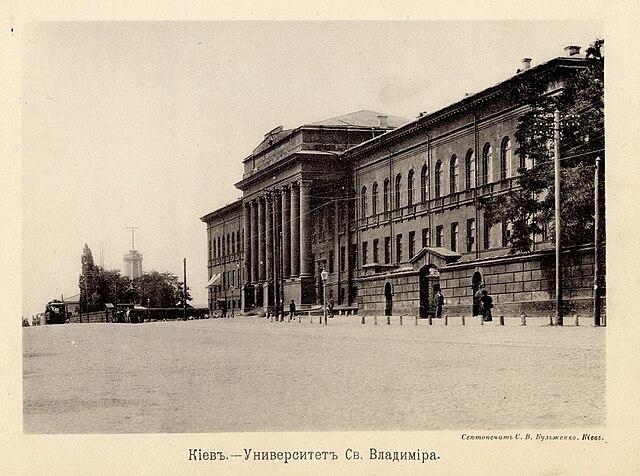
Kyiv period of Jakubanis’ life deserved a separate presentation, because our knowledge of his early career was far from satisfactory, not to mention some inaccurate or even false informations. M. Sargsyan was the first researcher who used Jakubanis’ documents from the University Library of the Catholic University of Lublin to such an extent, what was necessary to complete her task.
To present the life and academic activity of Jakubanis (on the right) in the Kyiv period in full, Sargsyan starts with his childhood and gymnasium education. Moreover, the history and philosophical traditions in the Saint Vladimir Imperial University of Kyiv are briefly sketched with an emphasis on Jakubanis’ study curriculum, the beginnings of his academic career and the personality of his supervisor, professor Alexei Gilarov. He was the professor who exerted the most significant impact on Jakubanis’ early works in the history of Greek philosophy.
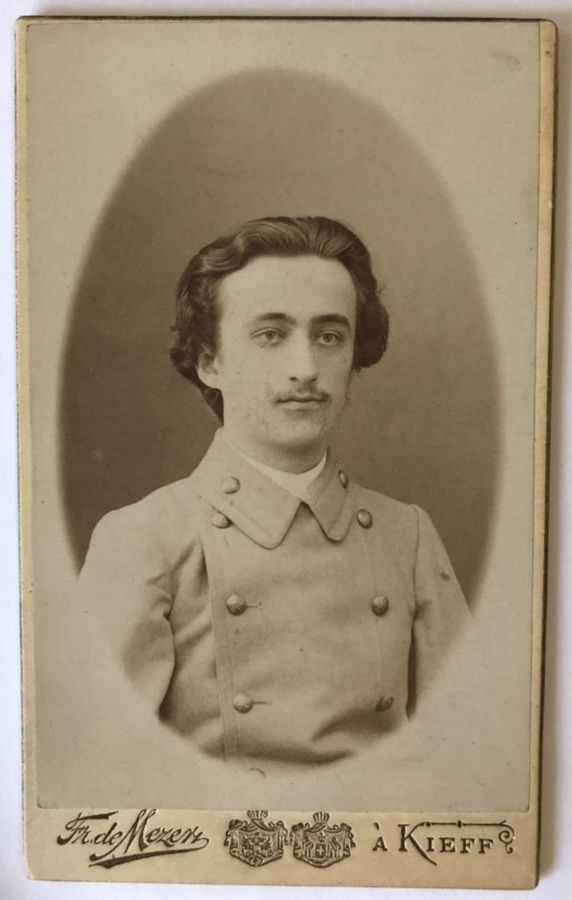
To conclude, it was in Kyiv where Jakubanis’ career as a teacher of classics and a researcher in the history of ancient philosophy started. Some of his achievements from this period are still of significance in the Russian-speaking world, for he is still remembered as the author of a work on Empedocles and one of the pioneers in translating fragments of this ancient thinker into Russian.
Another “Small Grant” from the University of Zielona Góra
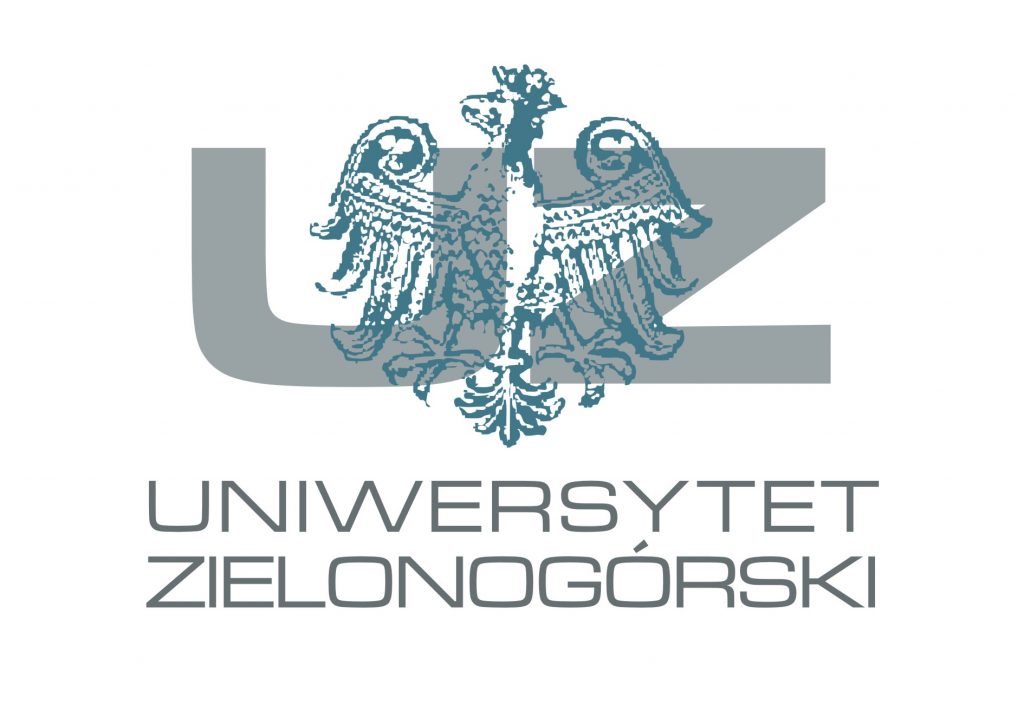
Prof. Justyna Patalas Maliszewska, the Deputy Rector for Science and International Cooperationof of the University of Zielona Góra (UZ), home institution of the AΦR, awarded Tomasz Mróz with a “Small Grant”. These internal grants are distributed by the Rector annually among those researchers of UZ, who have submitted their proposals to the National Science Centre (NCN), received positive assessements from the experts, yet finally have not been granted funding.
The aim of the “Small Grant” for AΦR is a preliminary research on the legacy of Bohdan Kieszkowski (1904-1997), an expert in Renaissance Italian Platonism. Funding will be spent on library research and attending an international conference.

This is the second “Small Grant” awarded to the AΦR research group.
The previous one was announced here.
AΦR at the 3rd Congress on Polish Philosophy
The 3rd Congress on Polish Philosophy took place in October (18th-20th) in the Rydzyna Palace. It gathered scholars interested in researching the tradition of Polish philosophy and developing it. Two members of the Ancient Φilosophy Reception research group took part in this philosophical event: Adrian Habura – online, and Tomasz Mróz – onsite. The first of them spoke about the concept of love in the works of Władysław Tatarkiewicz (1886-1980), while the latter – on the history of studies on the reception of ancient philosophy in Poland.
Mróz’s paper was directly concerned with problems related to the reception of ancient philosophy and started with quotes of diverse opinions of two eminent Polish researchers in the history of Greek philosophy, that is, Stefan Pawlicki (1839-1916) and Wincenty Lutosławski (1863-1954). Lutosławski, when composing his works on Plato, searched for Polish authors and their studies to provide references to them, while Pawlicki paid no interest to the works of his compatriots on Greek philosophy.
In more recent decades it was Izydora Dąmbska (1904-1983), a philosopher and historian of philosophy, who published a study on the reception of Plato in Poland (1972), but nowadays many books and papers on this topic were published by the members of the AΦR research group. Concluding his talk Mróz briefly presented research projects of the members of the AΦR and the books they had published, to start with the latest one:
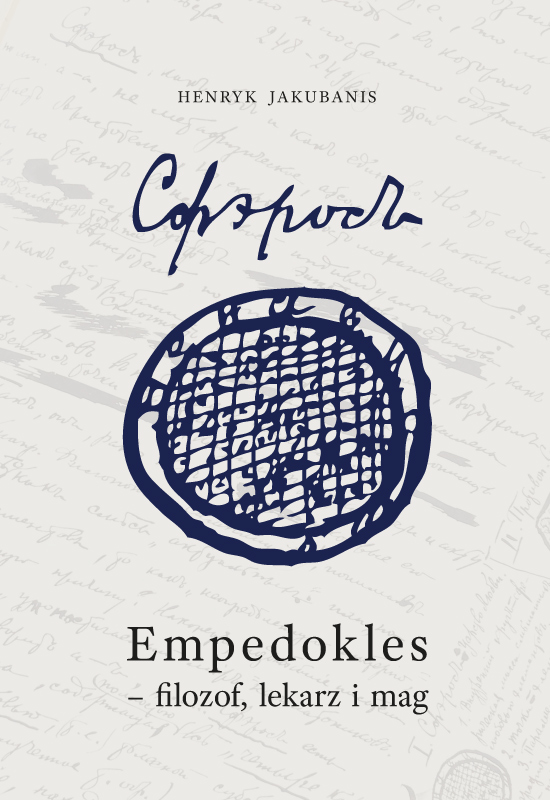
Henryk Jakubanis, Empedokles – filozof, lekarz i mag: Przyczynek do jego zrozumienia i oceny (Empedocles: a Philosopher, a Doctor and a Magus. Materials for Understanding and Assessing Him), transl. from Russian and ed. Mariam Sargsyan, A. Habura, Wydawnictwo Marek Derewiecki, Kęty 2024, 104 pp. (Studies and Texts in the History of Reception of Ancient Philosophy, vol. 3).
T. Mróz, Stanisław Lisiecki (1872-1960) i jego Platon (Stanisław Lisiecki (1872-1960) and His Plato), Wydawnictwo Marek Derewiecki, Kęty 2022, 150 pp. (Studies and Texts in the History of Reception of Ancient Philosophy, vol. 2).
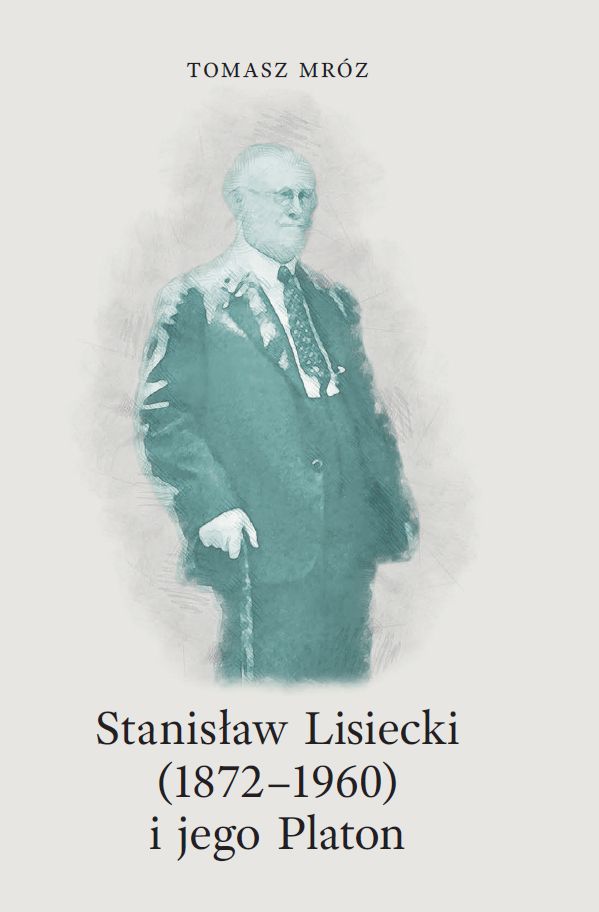
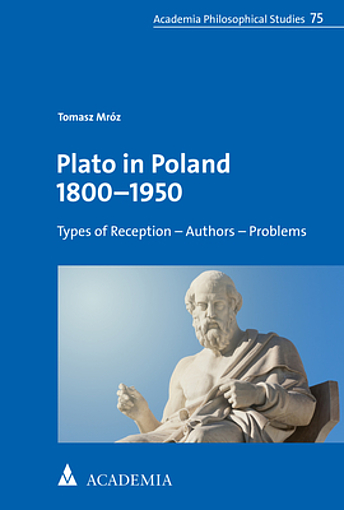
T. Mróz, Plato in Poland 1800-1950: Types of Reception – Authors – Problems, Academia Verlag / Nomos Verlagsgesellschaft, Baden Baden 2021, 480 pp. (Academia Philosophical Studies, vol. 75).
S. Lisiecki, O Platonie, Arystotelesie i o sobie samym (On Plato, Aristotle and on Himself), ed. T. Mróz, Wydawnictwo Marek Derewiecki, Kęty 2021, 367 pp. (Studies and Texts in the History of Reception of Ancient Philosophy, vol. 1).
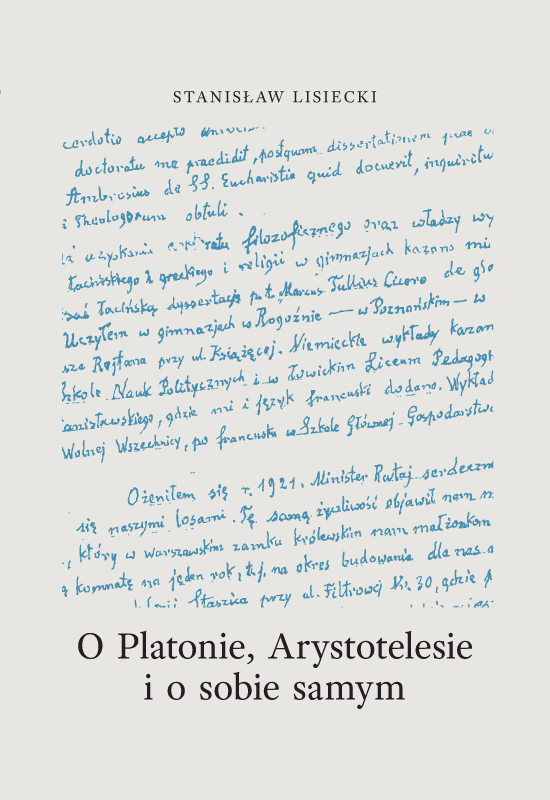
and some earlier ones…
Henryk Jakubanis and His Empedocles
Empedocles: a Philosopher, a Doctor and a Magus. Materials for Understanding and Assessing Him.
It was the title of the most important work by H. Jakubanis (1879-1949)
originally published in Kyiv in 1906.
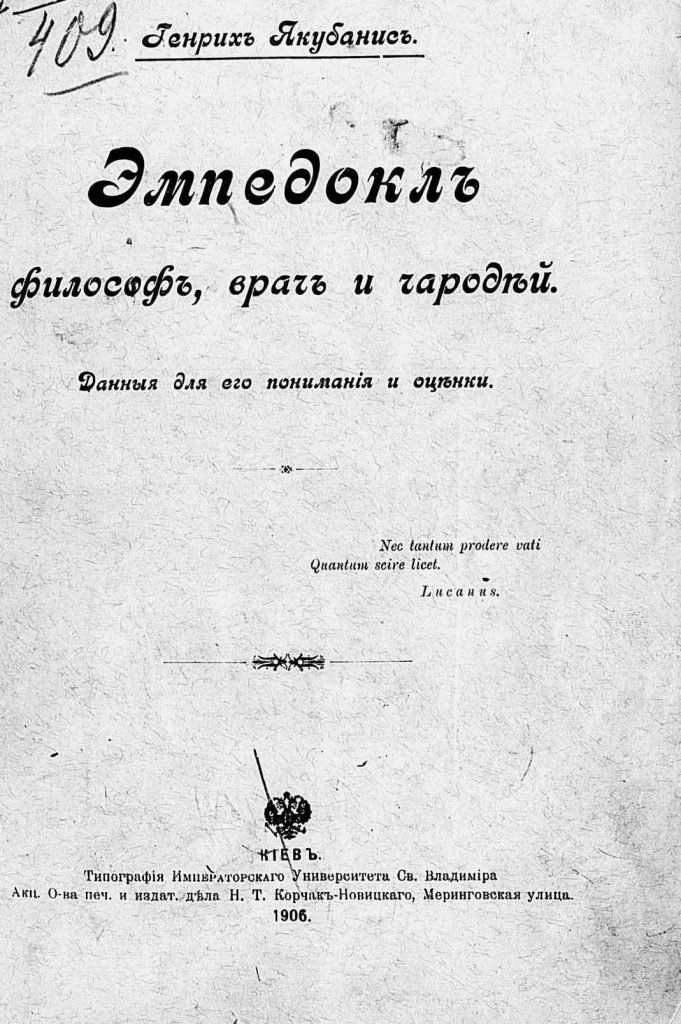
At the time of publishing this book the author was a young, 27 years old, lecturer and researcher at the St. Vladimir Imperial University of Kyiv. His area of competence and interest was established, it was ancient literature and philosophy with an emphasis on Greek philosophers. This volume consisted of two main parts: 1) Introductory presentation of Empedocles’ life, Sicilian society, culture etc., and finally – the sources of his philosophical thought. 2) Translations of the remaining fragments of Empedocles in verse and prose, with philological commentaries. It is the Jakubanis’ translation of the philosopher’s texts that won him recognition in the Russian-speaking world. Suffice to say that they are still in circulation today.
Jakubanis’s Empedocles had to wait for over a century to become finally available to Polish reading audiences. Until now this work had only been listed in bibliographies with no hint regarding its content. Two young Ph.D. students and researchers of AΦR group, Mariam Sargsyan and Adrian Habura, took their time to translate it from pre-reform Russian into well readable contemporary Polish. With their introduction the book was published as volume 3 of the book series published by Marek Derewiecki. Naturally, only Jakubanis’ own text was translated into Polish, for there was no need to re-translate his Russian renderings of Greek philosophical poetry. All the more so that Polish readers have a complete translation of Empedocles’ fragments by Katarzyna Kołakowska, a researcher from Jakubanis’ beloved Catholic University of Lublin.

It should only be added that the book is accompanied by an afterword by Kołakowska and it is available on the publisher’s website here.

This book is one of the results of the research project funded by National Science Centre on Henryk Jakubanis (1879-1949) as a classics scholar and historian of ancient philosophy.
“Oral History and the Classics” Team in Warsaw
On May 22th, 2024, Oral History and the Classics project team was honoured to pay a visit to Doctor Barbara Brzuska, who kindly agreed to be interviewed in her apartment in Warsaw. Dr Brzuska is another Polish scholar who gave her consent to answer our questions. She is a specialist in Latin, Latin literature, and – most importantly for AΦR – has published numerous works on the history of reception of antiquity in modern times and on the history of teaching classical topics in the 19th and 20th centuries, researching a variety of phaenomena of classical receptions among writers, poets, and philosophers. Let us add that we have previously managed to interview two Polish specialists in ancient philosophy, namely prof. Bogdan Dembiński in February 2024 in Katowice and prof. Andrzej Wesoły in December 2023 in Poznań. These two meetings have already been announced here and here. All these Polish interviews, plus Czech and Italian ones, furnished with English subtitles, will be included in the Oral History and the Classics collection on the website of the University of Hradec Králové.
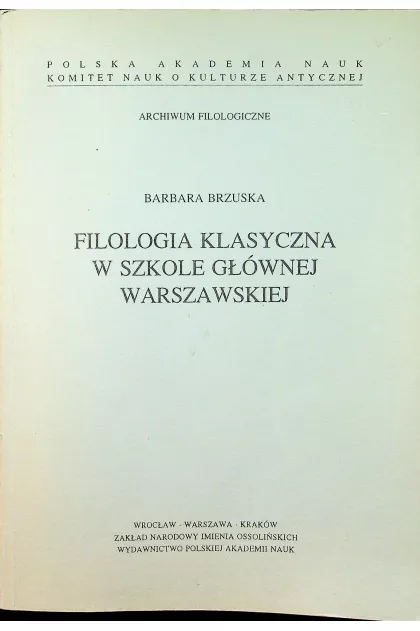
Dr B. Brzuska is now a retired lecturer of classical culture and instructor of Latin language. Her entire academic career was related to the University of Warsaw. One of her most important works was a study of the history of classical languages and culture in the Main School of Warsaw, a university that was working for a very limited time of a few years in Warsaw under Russian rule. This study, apart from a comprehensive investigation of its topic, offers much more to the readers, for it includes the background of the school and its later influences.
During the interview Dr Brzuska emphasised the role of popular works for wider audiences in instilling the interest in classics. It was also her case, for those were the books by Jan Parandowski (1895-1978) that attracted her to the classical world and subsequently inspired to learn classical languages. She recalled her memories of her university years and outstanding professors, with Kazimierz Kumaniecki (1905-1977) in the first place. Dr Brzuska, as a teacher of Latin with decades long experience, shared her views on the evolution of teaching methods and on the contemporary digital aids for learning, which can be of great help and a trap at the same time.
The interview was carried out by T. Mróz, while Jan Kadeřábek, a cinematographer and a cameraman, took care of all the technicalities. Both were very thankful for the casual and friendly atmosphere which was created by their kind and warm host and interviewee.
On the photo:
Dr B. Brzuska, T. Mróz and J. Kadeřábek
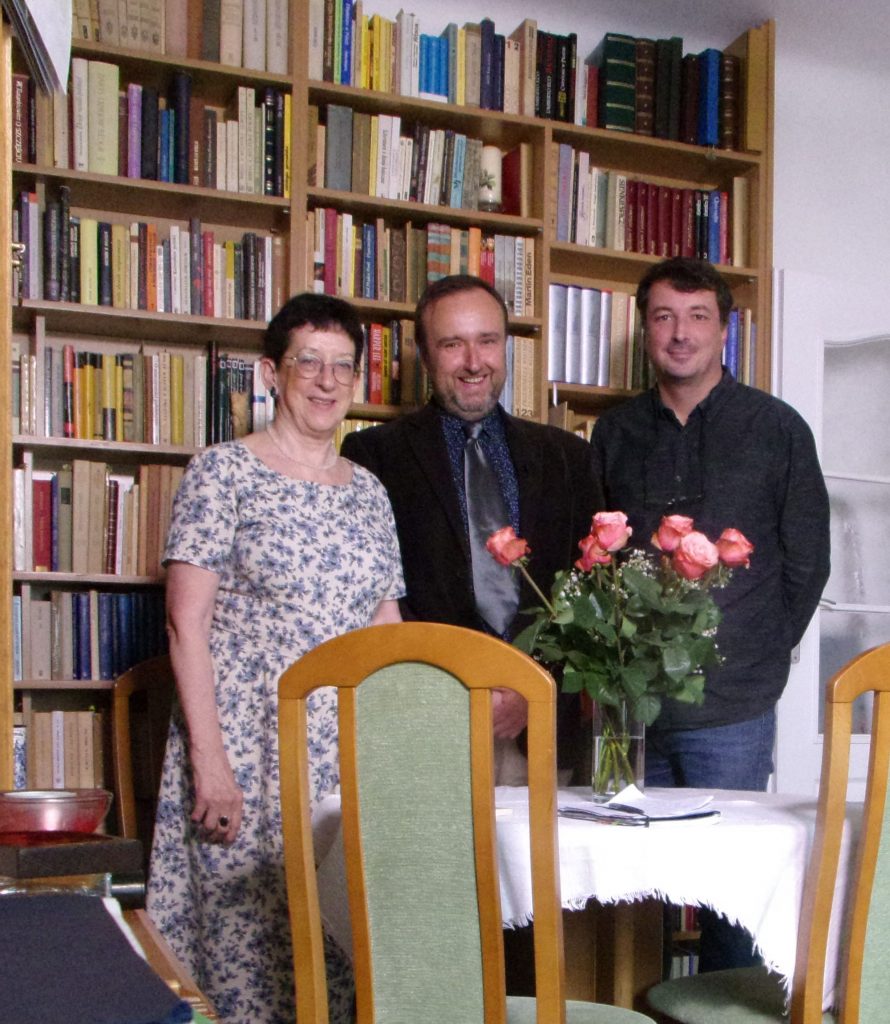
“Oral History and the Classics” Team in Katowice
On Feb. 27th, 2024, Oral History and the Classics project team enjoyed the honour to visit Professor Bogdan Dembiński in the Library of The University of Silesia (Uniwersytet Śląski, UŚ) in Katowice. Professor Dembiński is another Polish specialist in Greek philosophy who has agreed to give an interview which will be included in the Oral History and the Classics collection on the website of the University of Hradec Králové. In December 2023, as we have already announced, a similar interview was shot with prof. Andrzej Wesoły in Poznań.
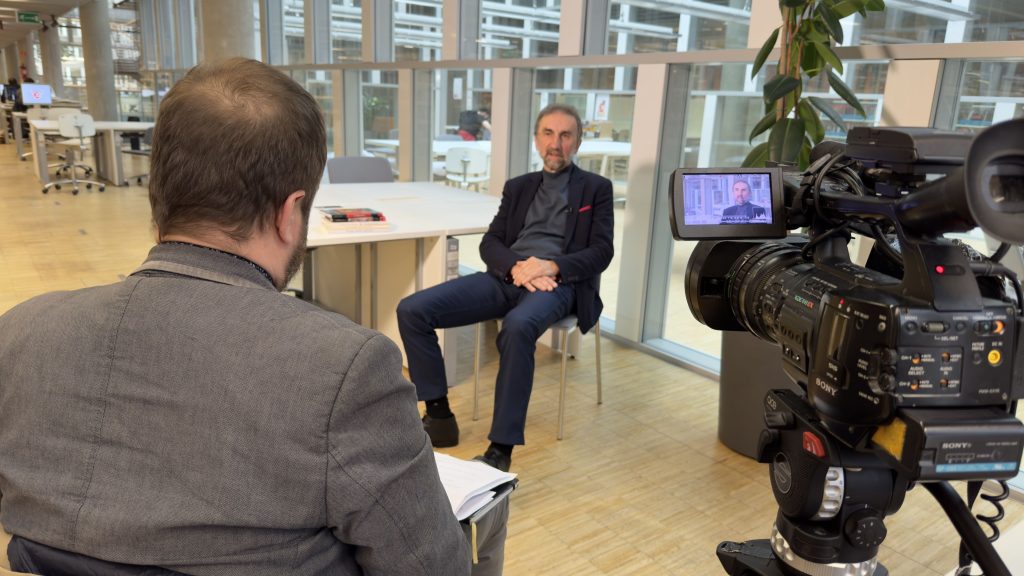
Bogdan Dembiński is currently a professor at UŚ, where he has taught and done his research work on Greek philosophy for almost four decades. Tomasz Mróz, who carried out the interview, in the last decade of the 20th century had been a participant in his lectures on ancient thought. The University of Silesia is not the only institution where prof. Dembiński delivers courses in philosophy. He teaches, for example, at The Karol Szymanowski Academy of Music in Katowice. He greatly appreciates this opportunity to introduce philosophy to the audiences who represent a different type of sensibility than philosophy students.
Having graduated in philosophy at the Catholic University of Lublin (KUL), Bogdan Dembiński returned to his home region of Silesia and received his Ph.D. on a thesis devoted to the philosophy of Martin Heidegger (1987). Apart from his university teachers it was Heidegger who induced him to focus on the everlasting legacy of Greek philosophy. Consequently, his postdoctoral thesis had Plato’s theory of ideas as its topic (1998) and subsequently Plato became the most important subject of his research. We shall add that prof. Dembiński was granted a title of the full professor in 2011 and then became a member of the Polish Academy of Arts and Sciences in Kraków.
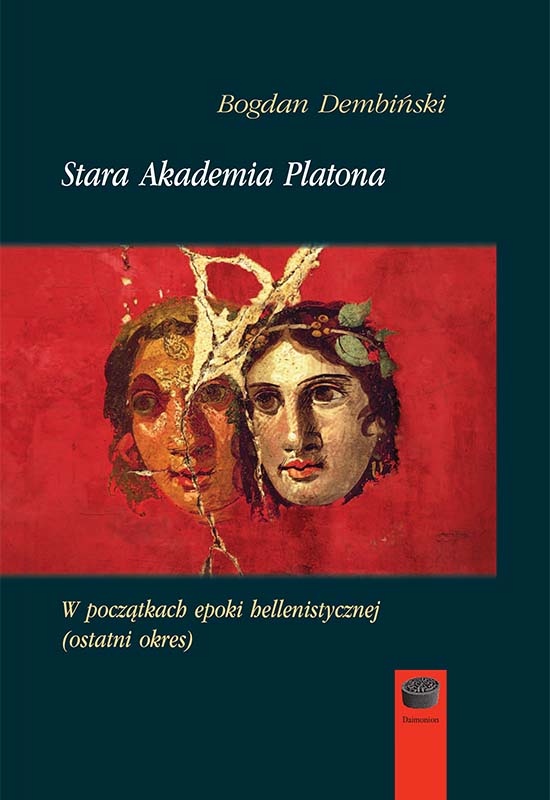
The list of books on Plato, which were authored by Bogdan Dembiński, includes: Teoria idei – ewolucja myśli Platońskiej [Theory of Ideas – the evolution of Plato’s thought], 1997 and re-editions; Późna nauka Platona – związki ontologii i matematyki [The Late Philosophy of Plato – relations between ontology and mathematics], 2003; Późny Platon i Stara Akademia [The Late Plato and the Old Academy], 2010; Stara Akademia Platona [Plato’s Old Academy], 2018.
Prof. Dembiński spoke about his academic curriculum and emphasised his current involvement in scientific activities of the Copernicus Center for Interdiciplinary Studies, founded by prof. Michał Heller, the recipient of the Templeton Prize. In Dembiński’s view, ancient Greek reflection on the nature and cosmos should be continuously referred to, not only by philosophers, by also by the representatives of contemporary natural sciences, theoretical physics and cosmology, for profound Greek ideas still have the power to stimulate research in many fields.
When the whole recording is edited and furnished with English subtitles, it will be make public and available on the project’s website. The interview meeting with prof. Dembiński would not be possible without his kind consent and hospitality of the UŚ Library staff. The interview was carried out by T. Mróz, while Jan Kadeřábek, a cinematographer and a cameraman, took care of all the technicalities.
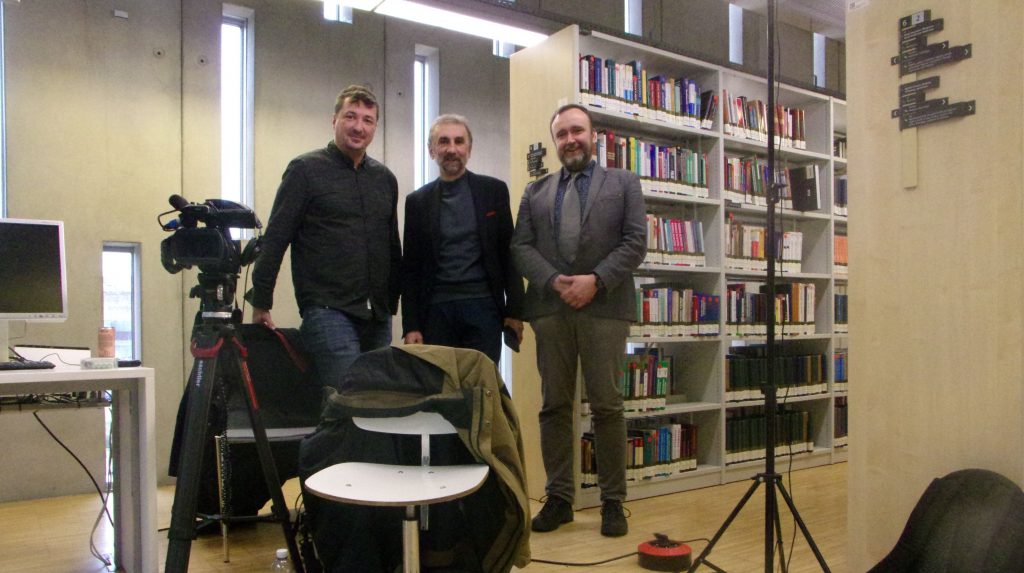
“Oral History and the Classics” Team in Poznań
On Dec. 5th, 2023, Oral History and the Classics project team enjoyed the honour to visit Professor Marian Andrzej Wesoły at his home, in the vicinity of Poznań. Prof. Wesoły agreed to give an interview which will be included in the Oral History and the Classics collection on the website of the University of Hradec Králové.
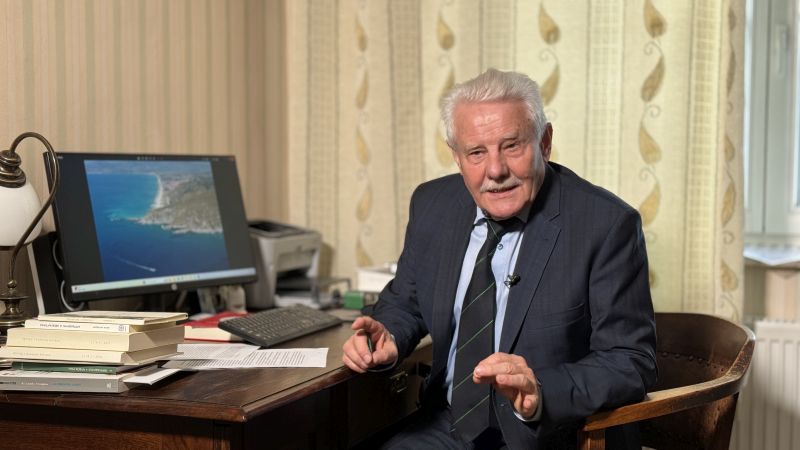
Marian Wesoły is currently a professor emeritus of Adam Mickiewicz University in Poznań and lectures at the Jacob of Paradies Academia in Gorzów Wielkopolski. His entire academic career in Poland was connected to Poznań and Adam Mickiewicz University. His doctoral (1977) and postdoctoral (1992) dissertations were devoted to the history of Greek philosophy. In 2008 he received the title of a full professor. He was granted several foreign scholarships, e.g. in Italy (1980: University of Padova, 1983: Italian Institute for History in Naples, 1997: Villa I Tatti), Germany (1986/87: University of Tübingen), and Greece (1993, 2000, 2012: Academy of Athens). Prof. Wesoły is a co-founder of the „Peitho. Examina Antiqua” journal. For 20 years he has regularly participated in the Eleatica-Symposia, initiated by Prof. Livio Rossetti at the Alario Foundation in Ascea, close to the ruins of ancient Elea/Velia. Finally, we should mention that on the 100th anniversary of the Adam Mickiewicz University in Poznań (2019) he was awarded Knight’s Cross of the Order of Polonia Restituta.
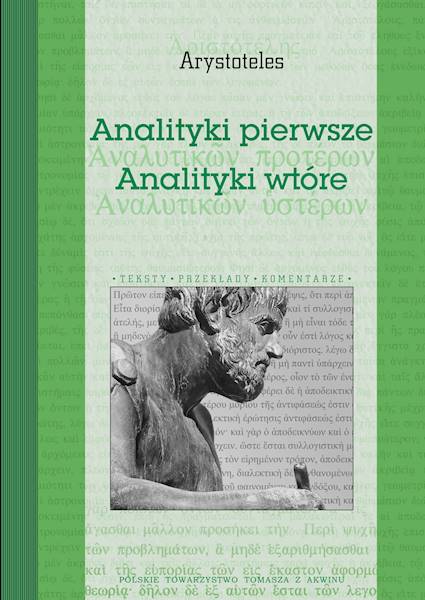
Prof. Wesoły is a specialist in Greco-Roman and Byzantine philosophies. In his numerous works he attempts to combine philological analyses with philosophical interpretation. Moreover, he is active as a translator and one of his most recent productions is a bilingual edition and commentary of Aristotle’s Analytica Priora et Posteriora (2020).
During the interview prof. Wesoły reflected on his academic and research curriculum, but also shared his views on perspectives of his discipline, on political constraints in researching ancient philosophy, recalled his memories of the great scholars whom had the opportunity to meet and with whom he collaborated etc. When the whole recording is edited and furnished with English subtitles, it will be make public and available on the project’s website.
The interview meeting with prof. Wesoły would not be possible without his kind consent and warm welcome of the team members by his family at their home. Those were Tomasz Mróz and Jaroslav Daneš who carried out the interview, while Jan Kadeřábek, a cinematographer and a cameraman, took care of all the technicalities.
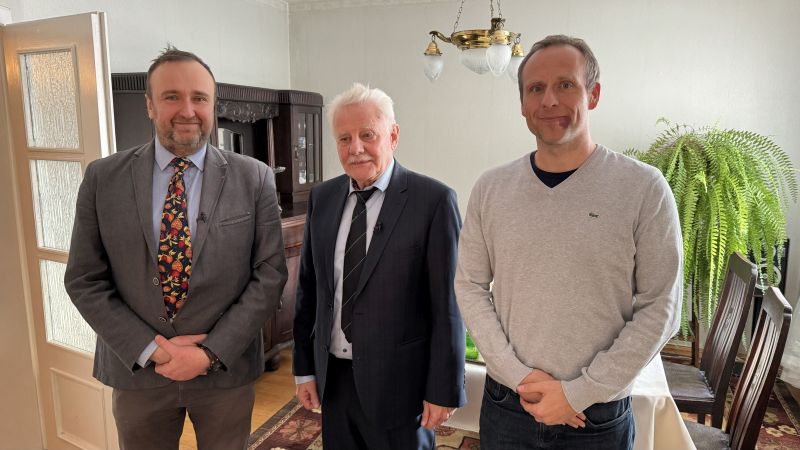
Recent commentaries